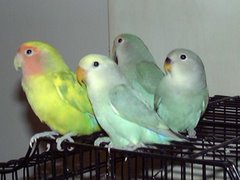Hygiene in lovebirds cage
If you keep and breed birds, hygiene is of utmost importance. That is why cages and aviaries need to be thoroughly cleaned on a regular basis. Just how often this needs to happen depends on the size of the cage or aviary, the number of birds living in it, the season, and the amount of droppings, waste food etc. To save costs, some people decide to sieve the ground cover of the cage or aviary, so that droppings and waste food are removed. Any invisible waste cannot, however, be removed by sieving, so that the risk of contamination remains. When you clean the ground cover of the cage, shed, or night house, you should remove the entire layer and replace it with a completely new one. The type of ground cover you should use will depend on the species of bird you keep. The best-known and most frequently used type of ground cover is shell sand, but wood chips, clean river sand and even pebbles are sometimes also used as a ground cover.
The walls, bars, and the floor of the cage or aviary should be disinfected on a regular basis. You can buy safe-cleaning agents from the pet shops. Perches, troughs, and baths should also be scrubbed out regularly with a disinfectant. The more hygienically you set about this, the less likely you are to be confronted with problems.
The walls, bars, and the floor of the cage or aviary should be disinfected on a regular basis. You can buy safe-cleaning agents from the pet shops. Perches, troughs, and baths should also be scrubbed out regularly with a disinfectant. The more hygienically you set about this, the less likely you are to be confronted with problems.







 Free Ads For Bloggers
Free Ads For Bloggers

